- Home
- Philip Pullman
The Butterfly Tattoo Page 7
The Butterfly Tattoo Read online
Page 7
‘But there was a third brother, see. Eddie, the youngest. He wasn’t involved directly. They had nothing on him at all. He was clean. Except that he was the worst of the lot. He was cold, see, clever … He was a thinker. And revenge … bloody hell, talk about the Mafia – that’s nothing on the Irish. Protestants, Catholics, they’re all as bad. So Eddie Carson’s out for revenge. And the trouble is, he knew it was me that got Billy killed and Frank banged up for twenty years. As far as Eddie was concerned, I was dead meat.
‘So there was nothing for it. Once your cover’s busted, that’s it, you might as well pack it in. They give me some money, new papers; I changed me name …’
He looked rather shamefaced at this, as if it were cowardly.
‘What, your name’s not really Miller?’ said Chris.
‘No. Sean doesn’t know, and I’m not sure I’m ever going to tell him. My name’s really Springer. Or it was. Legally it’s Miller, but, you know … So there it is. That’s what it’s all about.’
Chris had no way of judging how true the story was except his own knowledge of the world, and that (as Jenny had seen) was scanty. But he liked Barry and wanted to believe him, so he put aside any doubts that raised themselves, and tried to imagine the Barry he knew in the company of SAS men and terrorists. Only later did the story begin to feel thin and unlikely, as Chris found the obvious questions to ask; but he couldn’t bring it up again. It left Barry seeming smaller, somehow. Granted, you had to stoop to all kinds of things to catch terrorists, but to set them up like that … wasn’t that a kind of betrayal? And if he’d betrayed someone once, might he not do it again?
The next day Chris had to go out with Dave to take some equipment to a theatre group performing in the Oxford Union. This was a large Victorian building in the centre of town; it was where the famous Oxford Union debates took place, where undergraduate would-be politicians rubbed shoulders with government ministers and took the first steps on the road to Parliament. Chris had never been inside it before, but Dave was familiar with the place.
‘I spoke here once,’ he said as they unloaded the lighting trees on to the lawn.
‘Spoke? What d’you mean?’
‘In a debate. I think we lost.’
‘You? Really? When?’
‘When I was an undergraduate. I think it was Lady Antonia Fraser on the opposing side. I can’t remember. I was too nervous.’
Chris looked at him with new eyes. Dave was thin, shabby, wiry, with immensely long brown hair and a wispy beard, and he moved in a perpetual atmosphere of vague peaceableness, like a hippie.
‘Wow,’ said Chris. ‘I never thought of you like that.’
‘Well, it’s not exactly a conversational earth-shaker, so I don’t bother to mention it. I just remembered it, coming here.’
The theatre group was presenting a summer season of two plays, and they were about to change from one to the other, which was why they needed the new equipment. Chris and Dave carried it in, handed it over to the director, and were about to take out the pieces they no longer needed when Chris heard a voice he recognized.
The confident, arrogant tones came from around the corner of the wide corridor. It was the voice of the young man by the lake, the one named Piers.
Instantly Chris felt his flesh prickle. It was a chemical change; he couldn’t help it. The flood of adrenalin suffused his whole nature with fury. The memory of those few minutes by the lake and his passion for Jenny suddenly blazed, and he forgot Dave and the job they were doing and sprang to the corner of the corridor before Piers could vanish.
Piers, dressed with cool summer elegance, was talking to an elderly man and a girl of nineteen or so. He was saying, ‘Well, yes, of course normally I would. I was actually on my way to Cannes, but these God-awful people turned up, some cousins of Anna’s or something, and—’
Chris butted in.
‘Are you Piers?’
Piers turned, an expression of astonished contempt on his handsome face.
‘That’s my name, yes. Who are you?’
‘Where’s Jenny?’
‘I beg your pardon?’
‘D’you know where Jenny is?’
‘I don’t know what you’re talking about.’ Piers turned away, with a smile to the girl, who smiled back nervously.
‘Jenny!’ Chris said. ‘Where the hell is she?’
Piers took the girl’s arm and began to move away, as if Chris was something embarrassing like a beggar or a drunken vagrant. With a disapproving frown at Chris, the elderly man followed them down the corridor. Chris felt his rage spread like fire on petrol, to include the building as well, the pompous, oak-lined walls, the portraits of famous ex-presidents, the whole world Piers represented. He sprang after them and seized Piers by the arm, pulling him around.
‘Answer me! You know who Jenny is. You know exactly what I’m talking about, so where is she?’
For answer Piers slapped his face.
There was a moment’s silence in the corridor. Dave had come to see what was going on; a door had opened, and two faces were looking out; the elderly man and the girl stood frozen. The crack of the slap seemed to hang in the air like a gunshot.
Then Chris flung himself at Piers in the greatest rage he’d ever known. Piers was taller and heavier than he was, and he’d boxed at his public school. In a properly supervised match he’d have knocked Chris out in less than a minute. But no opponent he’d ever faced had come at him intending to kill. Chris did, and a horrified part of his mind was aware of it, but that wasn’t enough to hold him back; he was out of control. He was hit hard, more than once, but he didn’t feel the blows. He slammed into Piers, smashing him backwards and into the wall, and then hammered him down to the floor, his inhibitions blown away. All he heard were those drawling, contemptuous tones by the lake; all he saw was the arrogant lift of Piers’s lip; all he felt was the shame of that slap on his cheek. And all the time an image of Jenny frightened, hiding … He tore at the bigger man like a tiger, and if he could, he would have killed him.
But Dave was there, pulling him away, and the theatre director and someone else came to help. The girl was kneeling by Piers, and the elderly man was protesting angrily …
Chris was dumb. The anger was still there, but he was seeing more clearly, and hearing snatches of speech:
‘—don’t know what he was talking about—’
‘—like a mad dog—’
‘—fighting over a girl—’
‘—this chap hit him first, I saw it—’
‘—anything broken?’
‘Get out! Go on! Piss off, and don’t come back!’
As Dave drove them away, looking concerned, Chris sat trembling in the passenger seat, and began to realize what he’d done, and to feel the damage Piers’s blows had inflicted: his lip was cut, a tooth was loose, and he ached all over.
‘Wow,’ said Dave. ‘I thought you were sort of calm and easygoing. I’d never have expected that sort of operatic rage. That was really quite impressive. What is it, the phase of the moon or something? Does it come over you often?’
‘I’ve never done that before,’ said Chris carefully, trying not to let his voice shake.
‘You reminded me of Barry for a minute. You ever seen him in a rage?’
‘No.’ Shaking his head was painful; he spoke through a half-closed mouth.
‘He lost his rag with Tony a few weeks ago, when he bought that shed by the canal …’
Dave paused to negotiate the gap between a bus taking on passengers and a truck coming in the opposite direction. Even through his shame and the remains of his rage and his painful thudding headache, Chris took notice. How did Dave know about the shed if it was supposed to be a secret?
‘Why?’ he said.
‘Oh, Tony was teasing him. He kept referring to the shed as Barry’s love nest. Finally Barry flipped his lid and slung a lantern at him. Tony only just ducked in time, I swear it. One of those big Fresnels … it would have taken his
head off. It smashed to pieces. He hates being teased about his girlfriends, old Barry.’
‘What girlfriends? I thought he was happily married!’
‘Well, so he may be, but he’s still giving Sandra one, for a start. Participating in the rites of Venus at the back of the shop. You hadn’t noticed? Watch out for it, and you’ll see what I mean.’
Chris sat silent, sick to his heart. Everyone and everything and everywhere he looked was rotten, corrupt, poisoned to the core.
Chapter Ten
Jenny was alone. Some days went by without her speaking to anyone except the customers in the café and the other waitresses. Tommy Sanchez usually managed to find a minute or two to talk to her on her own, and she smiled and answered politely, then slipped away to clear a table or take an order before he could touch her.
She continued to look for Chris, but with less and less conviction. She wasn’t sure if she loved him, as he’d said he loved her; she didn’t think she deserved to love anyone. As for their weekend at Rose Hill, all she had left was a sense she’d never known in waking life and didn’t have a name for. In fact, it was goodness; it was the sense of being lapped and bathed in a goodness as fresh as the air in spring. But like all feelings known only in dreams, it had already begun to fade. Everything was fading. The exhilarating freedom of those first days away from home, when she knew she’d never see her father again; the bizarre, disjointed months with Tansy, which at least had been wild fun; the time with Piers, the champagne, the parties – they were dry and dead now, the leaves of another year.
So she looked for Chris, but fatalistically, half-convinced that she’d never see him again.
The house in which she was living belonged to a woman named Gill Petrie. She was in her thirties, with two children under ten, and she was a widow; her husband had died in a motorcycle accident two years before. It wasn’t easy for her to go out; she didn’t belong to a babysitting circle because she couldn’t leave her own children to sit with someone else’s. It wasn’t long before Jenny offered to babysit on her free nights, and Gill began to go out a little more.
One day she said to Jenny, ‘Could you babysit tomorrow? It’s not actually for me; it’s for a friend.’
Jenny agreed. There was nothing else to do, and at least she’d be earning a pound or two instead of spending her time compulsively on fruitless bus rides.
She turned up at the address Gill gave her at seven o’clock the next evening. It was a neat, modern little house like a thousand others, and the family was like a thousand others too: pretty, slightly anxious wife, good-humoured, bustling husband, shy young son. It was their wedding anniversary, the wife explained. They were going out for a meal, and they wouldn’t be back late. There was a snack and some coffee; there was the TV, the phone.
Jenny was puzzled by the wife’s anxiety. There was a shadow in the house as if someone were ill, and she couldn’t place it. She spent some time talking to Sean, the boy – or rather drawing him out and listening. She hadn’t had much to do with children, and she found him delightful. Her landlady Gill’s children were still very young, but she could really have a conversation with Sean, once he’d got over his shyness.
He was fascinated by science. He had a big star map on the wall of his bedroom, and he told her all about the big bang theory and how the universe was born. She looked down his microscope and saw the leg of a fly. She told him that, no, she didn’t really believe in unidentified flying objects, and he told her several different theories about them. He asked if she played chess, and she said no, she didn’t know the rules.
‘I’ll teach you,’ he said. ‘It’s complicated at first, but you soon get the hang of it.’
‘It’s time for you to go to bed,’ she said. ‘I promised your mum.’
‘Well, can I show you when I’m in bed?’
‘Only if you’re there in less than ten minutes from now.’
He was, so she sat on the bed – not unwillingly – and he set the pieces out on the board between them, with the duvet making it bend at the ridge, and began to explain. She listened with half an ear, asking questions occasionally so that he knew she was still with him; but most of her attention was absorbed by his innocent enthusiasm, his faith in the wonder of things, his untouchedness.
After he’d explained the moves he said, ‘Shall we have a game now?’
‘No, heck, it’s too late for that. Anyway, I’m hungry – I want my tea. And I said to your mum that you’d be in bed a long time before now.’
‘Will you play next time, then?’
‘All right, I promise.’
‘Can I read for a bit?’
‘Fifteen minutes.’
She watched as he swept the chess pieces into their box, dropped the board on the floor by his bed, and reached up for a book from the shelf above his head. Then – she couldn’t help it – she put her arms around him and kissed him. He submitted politely. He smelled of milk, toothpaste, innocence. She kissed him again, helplessly, like someone in love, and saw his eyes widen in surprise. She let go at once.
‘Goodnight, Sean,’ she said.
He said goodnight and she left the room, trembling with shame and longing. She knew what she wanted. She wanted to take that little boy’s face and press it to her breast. She wanted to kiss him again a hundred times. Desolate with self-hatred, she sat on the edge of the sofa in the last of the evening sunlight and wondered how deep the corruption went that her father had put into her. She was no better than he was; she should never babysit again. She should go and live on her own entirely; she shouldn’t live at all.
When it was dark, she went to the cheerful little kitchen, made some coffee, and listlessly picked up a biscuit. She didn’t really want it. She was deciding whether or not to put it back when the phone rang.
‘Hello?’ she said.
‘Hello,’ said a man’s voice. ‘Is that Barry Springer’s house?’
She had to think before she remembered their surname. ‘No,’ she said. ‘Mr and Mrs Miller.’
‘You’re not sure? I heard you hesitate.’
‘No, I’m sure. You probably got a wrong number.’
‘Who is this, anyway? Mrs Springer?’
‘What d’you mean?’
‘Who am I speaking to?’
‘I’m the babysitter.’
‘Ah, I see. He’s out, then.’
‘Well, it’s not the same name—’
‘Tell him Carson’s getting warm. Can you remember that?’
‘But who shall I say? And his name’s not—’
‘Oh, he’ll know. Don’t forget.’
And he put down the phone.
For no reason, Jenny felt cold all over. She poured the coffee and took it into the living room, where she sat watching a James Bond film without moving until the car drew up outside and she heard the key in the door.
‘Hello!’ said Mrs Miller. ‘Everything all right? Sean go to bed on time?’
Jenny got up and went into the kitchen with her. ‘Yeah, fine. He showed me how to play chess.’
‘He’s always looking for someone to play chess with him. D’you fancy a cup of tea? I always like tea after a meal, and they only did coffee in that place we went to.’
She filled the kettle and put three mugs out, bustling about, happily at home in her kitchen.
‘Did you have a nice meal?’
‘Yes, lovely … Italian. I like Italian; it’s my favourite. We’ll be all garlic tomorrow. Whereabouts do you work, love?’
She knew Jenny was a waitress. Jenny told her about Tommy Sanchez’s café.
‘But I don’t suppose I’ll be there for long,’ she said. ‘I don’t want to be a waitress for ever.’
Barry came in, rubbing his hands. ‘Sean’s fast asleep,’ he said. ‘What you done to him, eh?’
Jenny glanced at him anxiously, but he’d meant nothing by it. He picked up the biscuit she’d put down earlier and ate it whole.
‘Greedy pig,’ said his wi
fe. ‘You’ve just had a huge meal.’
‘Yeah, it was nice. We’ll go there again.’
He winked at Jenny. She smiled back. He was easy to like.
As they sat in the living room with their tea Sue said, ‘What are you going to do when you stop working in the café?’
‘I don’t know. I’ve got a friend who says I ought to study. Do A Levels. Go to college. But I don’t know what I’d study.’
‘Oh, you ought to,’ said Sue. ‘Really. I never did anything like that till recently, and I’m doing an Open University degree now. It’s fantastic! I never thought, you know, a person like me … But it gives you all kinds of new perspectives.’
‘Yeah. I can see that. I just …’
‘D’you like kids?’ said Barry.
‘I never had much to do with them, really. It was nice talking to Sean tonight. He’s a lovely boy, he really is.’
‘He’s the king of the world,’ said Barry proudly.
‘You could study to be a teacher,’ Sue told her. ‘I thought of doing that when I finish my degree. I’m a school secretary at the moment, but I’m sure I could teach.’
Jenny had never thought of teachers as being anything but alien, sullen, hostile failures. The thought of this pretty, pleasant, sensible woman being a teacher made her see all kinds of possibilities for a moment. The world seemed an open and friendly place.
After they’d had their tea, Barry offered to drive her home. She said no, it was only ten minutes’ walk, but he insisted. He didn’t like the idea of girls out alone at night.
In the car he said, ‘Is everything all right?’
‘What d’you mean?’
‘Well, excuse me if I’m out of order, but you just looked so unhappy when we got back.’
‘Oh!’ She didn’t know how to respond. ‘Well … no, I suppose it’s just my expression. I’m all right.’

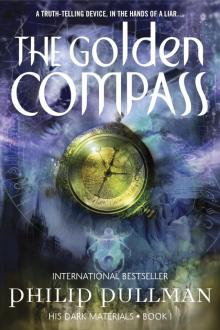 The Golden Compass
The Golden Compass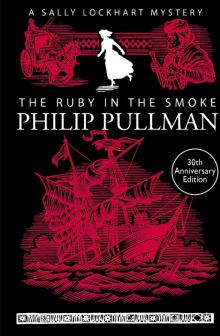 The Ruby in the Smoke
The Ruby in the Smoke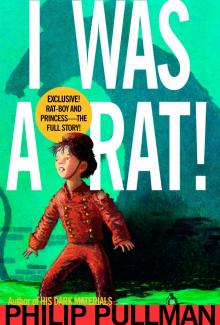 I Was a Rat!
I Was a Rat!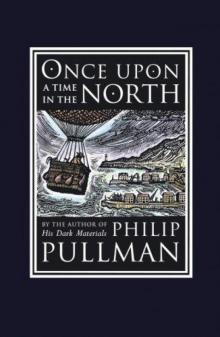 Once Upon a Time in the North
Once Upon a Time in the North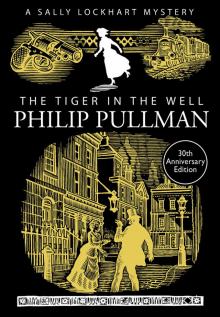 The Tiger in the Well
The Tiger in the Well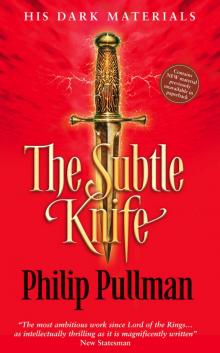 The Subtle Knife
The Subtle Knife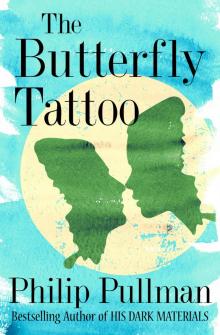 The Butterfly Tattoo
The Butterfly Tattoo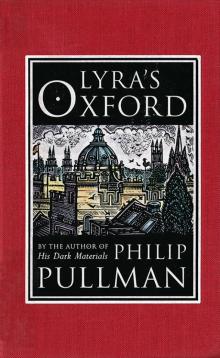 Lyra's Oxford
Lyra's Oxford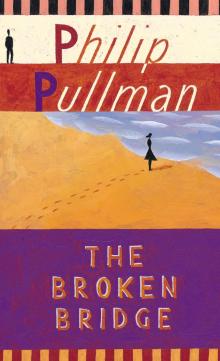 The Broken Bridge
The Broken Bridge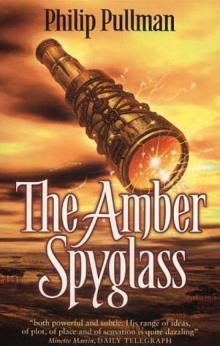 The Amber Spyglass
The Amber Spyglass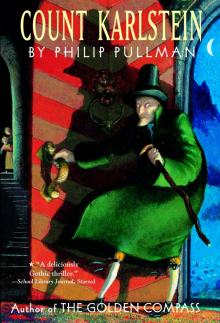 Count Karlstein
Count Karlstein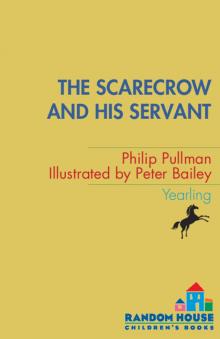 The Scarecrow and His Servant
The Scarecrow and His Servant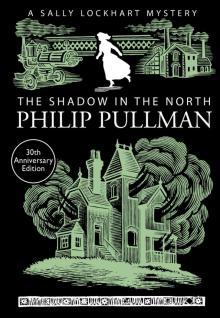 The Shadow in the North
The Shadow in the North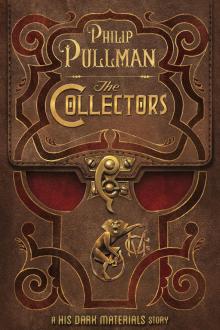 The Collectors
The Collectors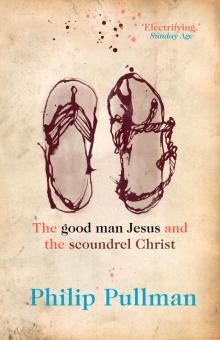 The Good Man Jesus and the Scoundrel Christ
The Good Man Jesus and the Scoundrel Christ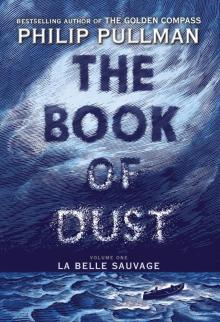 La Belle Sauvage
La Belle Sauvage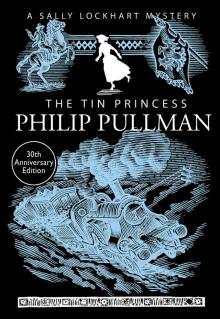 The Tin Princess
The Tin Princess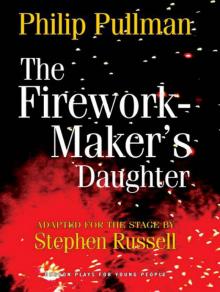 The Firework-Maker's Daughter
The Firework-Maker's Daughter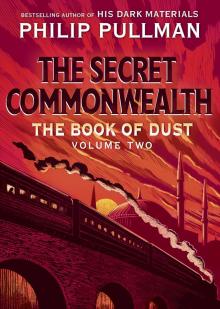 The Book of Dust: The Secret Commonwealth (Book of Dust, Volume 2)
The Book of Dust: The Secret Commonwealth (Book of Dust, Volume 2)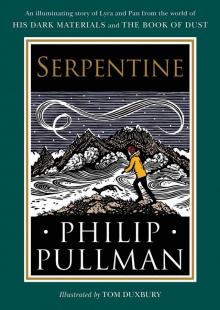 Serpentine
Serpentine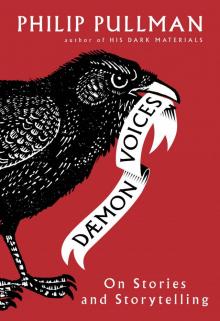 Daemon Voices
Daemon Voices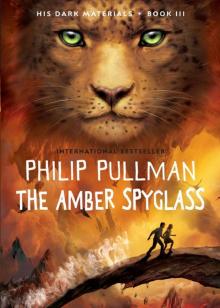 The Amber Spyglass: His Dark Materials
The Amber Spyglass: His Dark Materials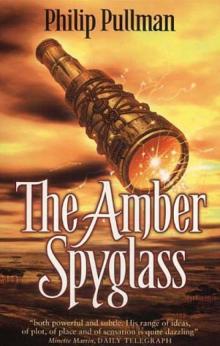 The Amber Spyglass hdm-3
The Amber Spyglass hdm-3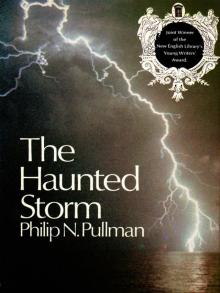 The Haunted Storm
The Haunted Storm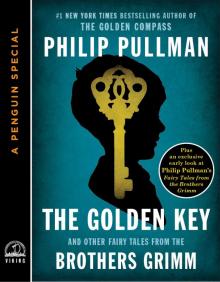 The Golden Key
The Golden Key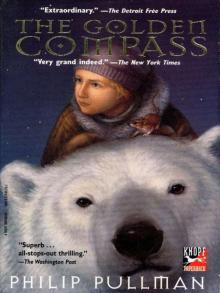 His Dark Materials 01 - The Golden Compass
His Dark Materials 01 - The Golden Compass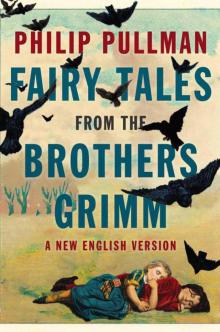 Fairy Tales from the Brothers Grimm: A New English Version
Fairy Tales from the Brothers Grimm: A New English Version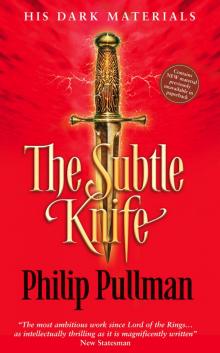 His Dark Materials 02 - The Subtle Knife
His Dark Materials 02 - The Subtle Knife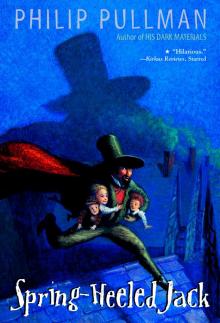 Spring-Heeled Jack
Spring-Heeled Jack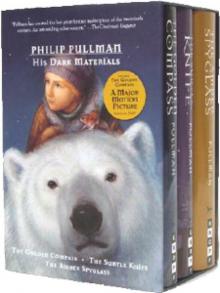 The Golden Compass hdm-1
The Golden Compass hdm-1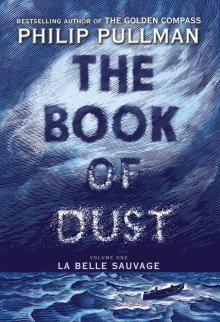 The Book of Dust, Volume 1
The Book of Dust, Volume 1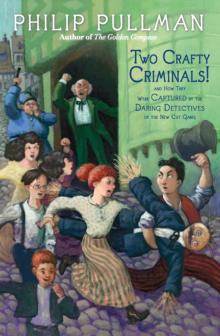 Two Crafty Criminals!
Two Crafty Criminals!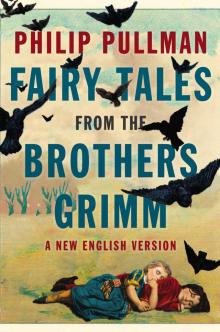 Fairy Tales from the Brothers Grimm
Fairy Tales from the Brothers Grimm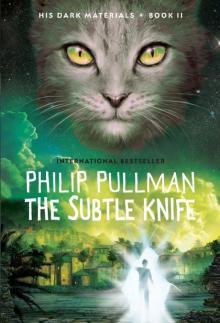 The Subtle Knife: His Dark Materials
The Subtle Knife: His Dark Materials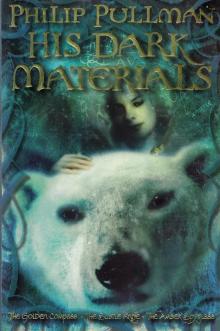 His Dark Materials Omnibus
His Dark Materials Omnibus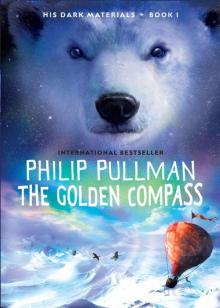 The Golden Compass: His Dark Materials
The Golden Compass: His Dark Materials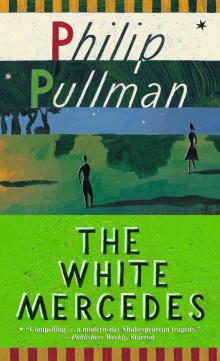 The White Mercedes
The White Mercedes